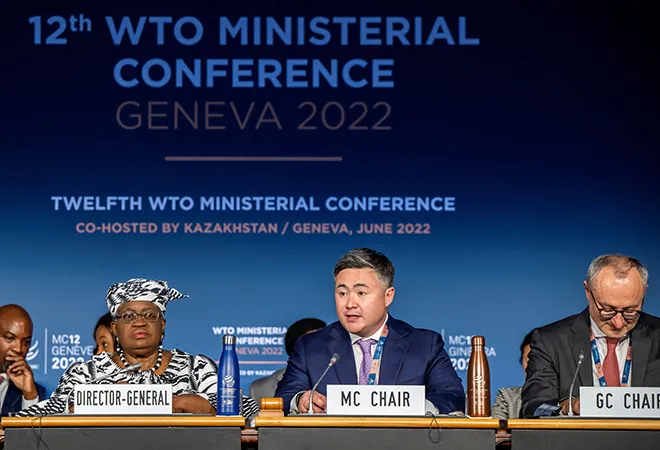-
CENTRES
Progammes & Centres
Location
The inability of the ministerial conferences in not being able to produce any fruitful declarations further undermined the effective functioning of the WTO.

The recently ended 12th Ministerial Conference (MC12) of the World Trade Organisation (WTO) has sent a wave of relief through the faithful of the current liberal trade architecture. The week-long conference is the highest decision-making authority in the WTO, as the organisation draws its authority from its members. Intended to be held every two years, the conference this time, delayed by the pandemic, happened four years too late.
To understand why, it is important to understand the state of the WTO post MC11 which took place in December 2017. The Buenos Aires Ministerial had been considered a failure as there was no outcome document, no ministerial declarations, and no agreements adopted at the end of the conference, only commitment decisions for future negotiations.
The AB is the standing arm of the Dispute Settlement system and is supposed to have a minimum of seven members as per Article 17 of the Dispute Settlement Understanding, with three members assigned per dispute.
In the interim between MC11 and MC12, the trade war between the United States (US) and China, which was underway since November 2017, kept escalating. A brewing crisis at the time was the slow demise of the Appellate Body (AB) of the WTO, its crown jewel so to speak. The AB is the standing arm of the Dispute Settlement system and is supposed to have a minimum of seven members as per Article 17 of the Dispute Settlement Understanding, with three members assigned per dispute. The Obama administration had been blocking appointments to the AB even before the Trump administration became openly hostile to trade. As a result, by October 2016, the body was down to four members. The crisis peaked in 2020 with no members currently serving, paralysing an entire arm and function of the WTO.
Over the years, questions have been raised over the functioning of the WTO given the lack of consensus even as the membership has expanded. The 164 members ensure diversity and representation. At the same time, the wide membership also creates hurdles in decision-making. Amrita Narlikar’s observation from over 10 years ago—that the WTO was able to reduce its fairness deficit but not its efficiency deficit takes on new relevance. There are two things to learn from MC 12, (i) the system still functions, and (ii) we still know how to use it. What we have lost in consensus and content, we have made up for in upholding institutions and procedures.
However, much has been made of what is in the final analysis of non-outcomes from MC12. What the WTO and others have claimed as an ‘unprecedented’ round of negotiations in terms of outcomes, is only unprecedented to the extent that there were any decisions at all. While decisions were made on food security, e-commerce, fisheries subsidies, Trade Related Aspects of Intellectual Property Rights (TRIPS), and Sanitary and Phytosanitary Measures (SPS), three issues stand out.
The first issue is that the decision on the E-Commerce Moratorium is the usual extension that takes place at every ministerial, making sure that our international internet calls and emails (electronic transmissions) remain duty-free at least till MC13.
There are two things to learn from MC 12, (i) the system still functions, and (ii) we still know how to use it. What we have lost in consensus and content, we have made up for in upholding institutions and procedures.
Second is the decision on the waiver of some TRIPS provisions, in light of the COVID-19 pandemic. The decision is not only two years too late, but it also gives too little. The waiver only covers COVID-19 vaccines, with a six-month timeline to decide on the extension of this waiver to COVID-19 diagnostics and therapeutics (point 8 of the decision).
The real achievement, if it can be called one, on the public health front, is in the Ministerial Declaration on the WTO response to COVID-19 and future pandemics. The text contains a specific rebuke and reminder to the developed countries of their commitment under Article 66.2 of the TRIPS Agreement, which urges them to encourage technology transfer from their countries to the Least Developed Countries. It also includes a series of issues the members should consider to prepare for future pandemics like export restrictions, trade facilitation, regulatory cooperation, and transparency, amongst others.
The third is the agreement on fisheries subsidies which is supposedly the highlight of this round. It is the first agreement that the WTO has successfully concluded since the Trade Facilitation Agreement in 2013. The agreement, however, has a self-destruct clause. Article 12 of the text states that the agreement will be terminated if ‘comprehensive disciplines’ are not adopted under it. This is both startling to have in a multilateral understanding, and also unsurprising given the dissent the agreement is facing from the developing world. From an optimist’s perspective, this might be seen as an innovation in multilateral decision-making and the path of least resistance. The true test will come at the end of the four-year term of the agreement.
At the end of the day, the problem at the WTO seems to be the differing goals of the members and the WTO’s tendency to favour dominant voices from the membership. While there are many instances of this, two stand out this time around.
Instead of alleviating the concerns of countries like India, there is a tendency to bulldoze or ignore these issues reducing what are serious development concerns to diplomatic tantrums.
The first is a series of tweets by the WTO Director-General at the end of MC 12. Whilst congratulating the membership on a successful conclusion to the conference, she singled out three members for special thanks—the EU, the US, and China. It is a near public admission of the green room deliberations that took place at this ministerial and the problem of representation that these side deliberations prove. The second instance that highlights the careless attitude of the dominant voices of the WTO regarding the dissenting voices is a quote from a so-called diplomat in Geneva. The diplomat compares India to a ‘fussy child’ who mustn’t be allowed to get away with things. This is likely a very specific representation of larger general attitudes to dissenting voices at the WTO at the moment. Instead of alleviating the concerns of countries like India, there is a tendency to bulldoze or ignore these issues reducing what are serious development concerns to diplomatic tantrums.
Perhaps the greatest disappointment of this Ministerial round is the glaring lack of discussion on WTO reform which finds mention only once in the Outcome document. There is a vague commitment to discuss reform issues in appropriate forums within the WTO, which are to make a submission at the next ministerial.
The negotiation function of the WTO, which is fulfilled in set ‘Rounds’ with specific issues under negotiation, has been undermined by this round.
What will be made of the zombie that is the Doha Round of negotiations, remains to be seen. The negotiation function of the WTO, which is fulfilled in set ‘Rounds’ with specific issues under negotiation, has been undermined by this round. If we look at Table 1, the Doha Round, which is the first proper round of negotiations since the Uruguay Round establishing the WTO, has lasted for 246 months as of June 2022. This time of over two decades has seen rapid changes in economic structures and functions, due largely to the digital revolution. The Doha agenda is clearly outdated, to the point that many had claimed that ‘Doha is dead’ back in 2015. It is seven years hence and there is no official news on the death of Doha, nor a ‘Dear John’ letter announcing the end of it.
The advent of ‘Joint Statement Initiatives’ (JSI’s) has caused tension amongst members with some, including India, claiming that these JSI’s undermine the spirit of multilateralism. Given this criticism, it is clear that the Doha round needs a serious update or at least closure to re-validate the multilateral system so as not to be reduced to a two-yearly Pavlovian exercise.
Table 1: Timeline of negotiations at the GATT/WTO
| Round | Start Date | End Date | Number of Months |
| Geneva Round | April 1947 | October 1947 | 7 |
| Annecy Round | April 1949 | August 1949 | 5 |
| Torquay Round | September 1950 | January 1951 | 8 |
| Geneva II Round | January 1956 | May 1956 | 5 |
| Dillion Round | September 1960 | July 1962 | 11 |
| Kennedy Round | May 1964 | June 1967 | 48 |
| Tokyo Round | September 1973 | April 1979 | 74 |
| Uruguay Round | September 1986 | April 1994 | 87 |
| Doha Round * | November 2001 | Present | 246 |
Source: World Trade Organisation
The views expressed above belong to the author(s). ORF research and analyses now available on Telegram! Click here to access our curated content — blogs, longforms and interviews.

Jhanvi Tripathi is an Associate Fellow with the Observer Research Foundation’s (ORF) Geoeconomics Programme. She served as the coordinator for the Think20 India secretariat during ...
Read More +